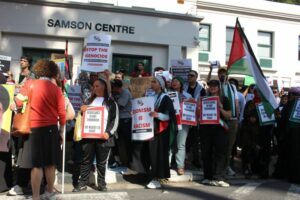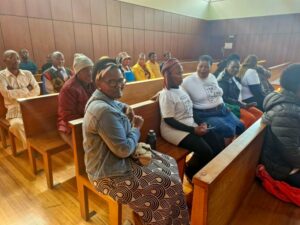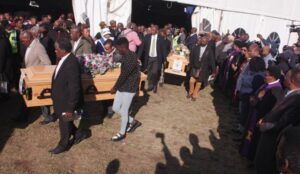Emotions ran high and tempers flared as community and labour activists related their stories of human rights violations at the hands of big corporations whose sole pursuit is profit. Mining communities of Sekhukhune in Limpopo, Melmoth in KZN, Xolobeni in Eastern Cape and Marikana in North West bear the brunt of mining companies’ rapacious appetite and stand to lose the most when their land is excavated and left to decay, people are displaced, water contaminated and the air polluted. When they dare to challenge the actions of these companies, they have been threatened and killed.
In order to find resolutions and eventually hold these companies accountable, delegates gathered in Braamfontein, Johannesburg, for a two-day indaba where they discussed inputs and suggestions on the third draft of a legally binding treaty against human rights violations by businesses, which will be presented later this year at the United Nations’ Human Rights Council in Geneva, Switzerland. Currently, there are gaps in domestic and international laws to hold especially multinational corporations accountable.
“Our government has failed us, they are the puppets of the multinational companies,” charged Nontle Mbuthuma, the spokesperson of the Amadiba Crisis Committee in Xolobeni, Eastern Cape.
“Our lives are under threat by the big corporates. You know since they have discovered minerals in our land, our lives have changed completely from good to bad. There is a lot of intimidations and assassinations, followed by brutality and bribes. They bought our chiefs four-by-fours in order to sign a mining deal. We ended up taking government to court. They are not willing to work with us; instead, they chose a big corporate over us. We wanted to have services such as roads, water and clinics; they refused and reminded us that we denied companies to have the mining rights. This is bad.”
Amadiba Crisis Committee has been opposing the titanium mining project by Australian company, Mineral Commodities, since 2005. Photo by Amandla/AIDC
Her counterpart from Melmoth in KZN, Simphiwe Hlabisa of Right To Say No, agrees: “In our area they damaged trees and as African people we can use trees for muti and other traditional rituals. They damaged rivers and left our livestock with no water. And also our chiefs were easily manipulated by these companies. We stood up although some of our leaders paid with their lives. So this treaty to us it’s very important as it will represent the voice of ordinary masses on the ground.”
From Marikana in the North West, Boitumelo Ngobeni of Benchmarks Foundation, says that 10 years after the Marikana massacre, nothing has changed: “Still no answers for the victims. Now it’s worse since Lonmin has changed the name to Sibanye-Stillwater. What is painful for me is that there is a local high school which is old and rundown; they can’t assist to build a new school. Other things, they now hire foreign nationals for cheap labour. There is a bus which regularly travels to Mozambique and Lesotho to fetch migrants. To get jobs locals are forced to pay a bribe and as a woman and desperate, you are tempted to sell your body to survive,” she says. She is skeptical that the treaty will win justice for the people of Marikana, but is unwilling to give up hope.
Trade union investment companies were also not spared a caution that in order to work successfully with social partners and lobby for the ratification of the treaty by the Human Rights Council, they should go back to the drawing board and advance the mandate of their constituencies. Investment and economic growth is not an end-goal and broader social development requires that the government tread carefully and strike a balance between competing interests. “We are very sympathetic to that cause [economic growth] especially since the impact of Covid-19 pushed unemployment higher still. I believe there is a need for development but that development should be human centred, respect the environment, respect women and children, and must also grow the economy for everyone. That’s a balancing act we want which must favour human rights as per the constitution,” says Professor Tshepo Madlingozi, director of the Centre for Applied Legal Studies (CALS) at Wits University.
Although the process to draft the treaty has come a long way since it was started by South Africa and Ecuador in 2014, and seemingly still has a stretch ahead, many delegates at the indaba agree the journey is worth pursuing. “In as much as it is taking so long, it’s so important. It’s a part of a bigger plan and discussion to start forcing the state do something on corporate power,” says Busisiwe Kamolane-Kgadima, attorney and research coordinator at CALS.
The binding nature of the Treaty should also be carefully looked at: “It should not just come up with rules and regulations that are voluntary for these companies. It must make it obligatory for companies to respect human rights and in case of violations, they must be brought to book and made to account. Consequence management must be there and the victims must be compensated. Laws must be enforced and companies must comply,” says Dr. Francis Moloi, chief director of human rights and humanitarian affairs at the Department of International Relations and Cooperation.
He says for this treaty to be realised, it will need the support of all like-minded civil society organisations and governments at home and beyond the continent, as those states which are complicit, especially in the global north, are pushing back and already opting for voluntary mechanisms and self-regulation. This is going to be a tough road.





